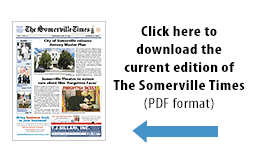 By Joseph A. Curtatone
By Joseph A. Curtatone
(The opinions and views expressed in the commentaries of The Somerville Times belong solely to the authors of those commentaries and do not reflect the views or opinions of The Somerville Times, its staff or publishers)
We’ve never seen as much recorded snowfall as we did this past winter. Snow budgets across the Commonwealth were shattered. Now as we enter budget season and the snow bills must be paid, some Massachusetts city and town officials are expressing satisfaction that their proposed budgets do not contain layoffs. Others are considering tax hikes or cuts in services to balance the budget for the coming year. There is even talk in some cities and towns about passing an override. But not in Somerville. In Somerville, we planned for this. We saved for this. We were ready for this. So forget about avoiding layoffs or cuts in services—we’re still able to strategically adding staff to improve services. While other communities are stalling out or taking steps backward, we are continuing to move forward. Our proposed fiscal 2016 budget that I am submitting to the Board of Aldermen this week, invests more in our kids’ education, public safety, affordability efforts, and the services that our community expects and deserves. We can make these continued investments because of prudent planning, smart saving and strategic investments. We planned for days like these—and that’s why we weathered the storm.
We budgeted $936,000 for snow removal this past year, a good figure that allows us to pay for most snow operations in a usual winter and cover any costs exceeding the budget with free cash (that’s a boost from prior years when we budgeted $650,000). But as we all know, this winter was anything but usual, and we ended up spending more than $10 million on snow removal. Driving that figure is the fact that we kept our snow emergency in place longer than most, if not all, other Massachusetts communities for the sake of public safety. We plowed and hauled more than most communities due to our narrow streets and higher on-street parking demand, which necessitated our crews to not only plow but to haul the snow away to snow farms. We had to ensure that during these storms, fire trucks and emergency vehicles could get down our streets. Simply put, we were working round the clock to reduce the risk to life. So we kept the emergency in place as we hauled, and as members of the public who experienced more difficult conditions in other cities and towns applauded our efforts.
We made the right choice for public safety. Now we have to pay the bill, like everyone else. What makes us different from everyone else is that while we invested in our community over the past decade and grew our local economy, we made those investments strategically, giving us the ability to save and build up stabilization accounts that we created. When I first took office as Mayor in 2004, the City of Somerville had exactly one stabilization fund. It was for our water budget and it held $240,000. We had no rainy day fund. We had no reserves for capital planning projects, meaning anytime we needed to make a large capital purchase (for example, for equipment or building repairs), we had to tap our general fund or—more likely—borrow money to buy the things we needed. So we created those reserve accounts and started putting money away, just like you might as you save for future unexpected needs or emergencies. At the same time, we continued investing in our community and building a sustainable local economic engine. Today, our reserve levels total more than $21 million, an increase of roughly 100 fold.
There were plenty of opportunities to veer from our course. The Great Recession in 2008 and 2009 sapped revenues and caused budget deficits at the local and state levels. When adjusted for inflation, general local aid was cut 36 percent from the end of fiscal 2008 through fiscal 2012, “more deeply than many other state programs” according to the Massachusetts Budget and Policy Center. Even before the Great Recession, state level tax cuts led to less revenue and reduced local aid. Again adjusting for inflation, since 2000, Somerville has lost more than $42 million in local aid. We could have chosen not to save as much, focusing on our immediate needs, or take a heavily conservative approach and not invest in the community as much and save more. We could have taken one-time revenues like building permit fees and, in the wake of lost local aid, used those to fund operating expenses for the year ahead. But we remained patient and stuck to our long-term planning. It’s why our bond ratings are the highest they’ve ever been—which coincidentally saves us money when we borrow to purchase equipment like snow blowers, melters and loaders. Both Moody’s and Standard & Poor’s specifically citing our “conservative budgetary practices” and our reserve levels, along with our economic development, as the reasons why our financial position remains stable despite historic state aid declines.
Those years of patience have paid off time and time again, but especially so this year. We were ready for the unexpected and for this winter’s emergencies. So now we won’t stand still this year. We will move forward just as our community expects and deserves. After a decade of accolades, we believe we can do more, and do better. We will continue investing in our community and improve services in next year’s budget—and our bright future is possible because of our prudent long-range planning of the past.















Reader Comments